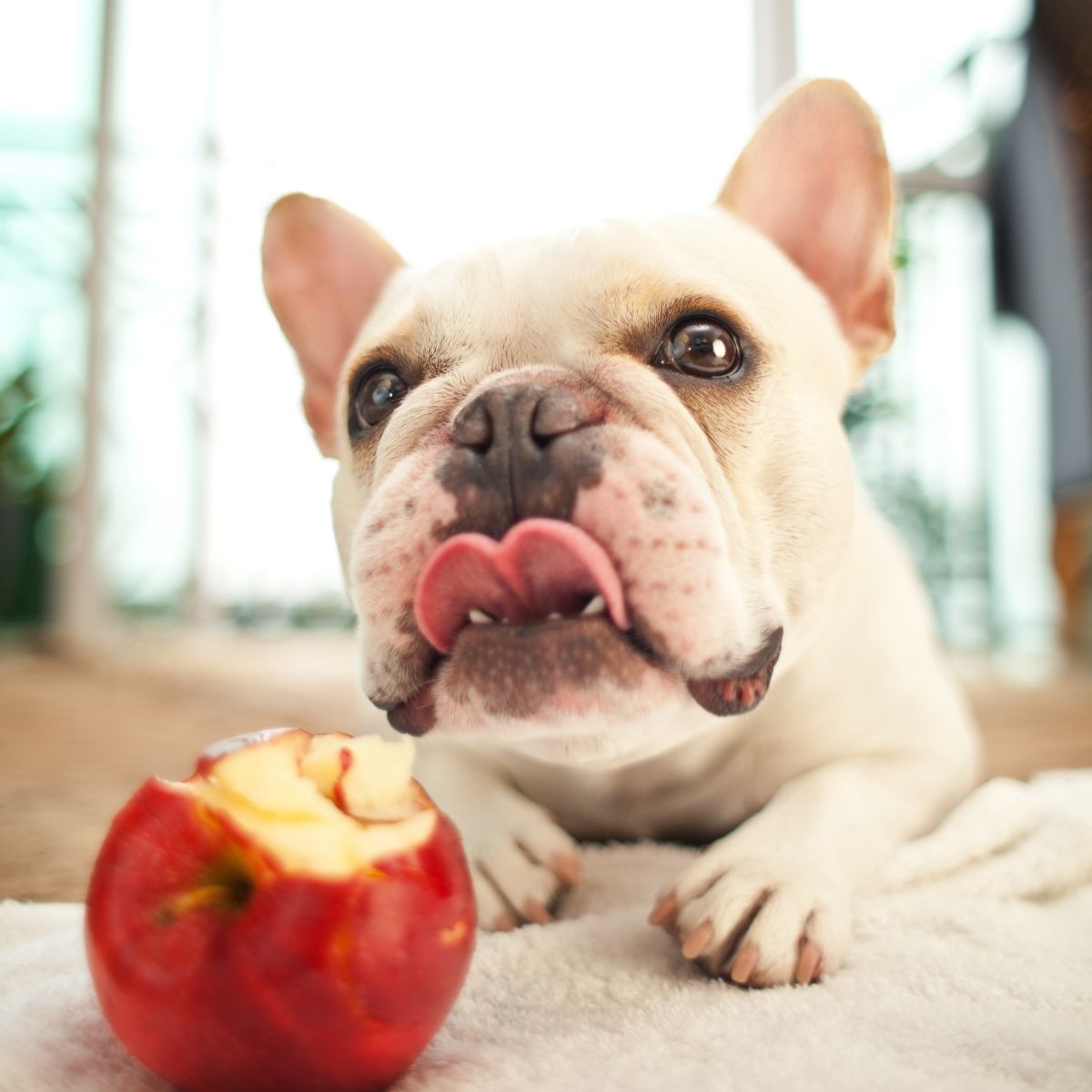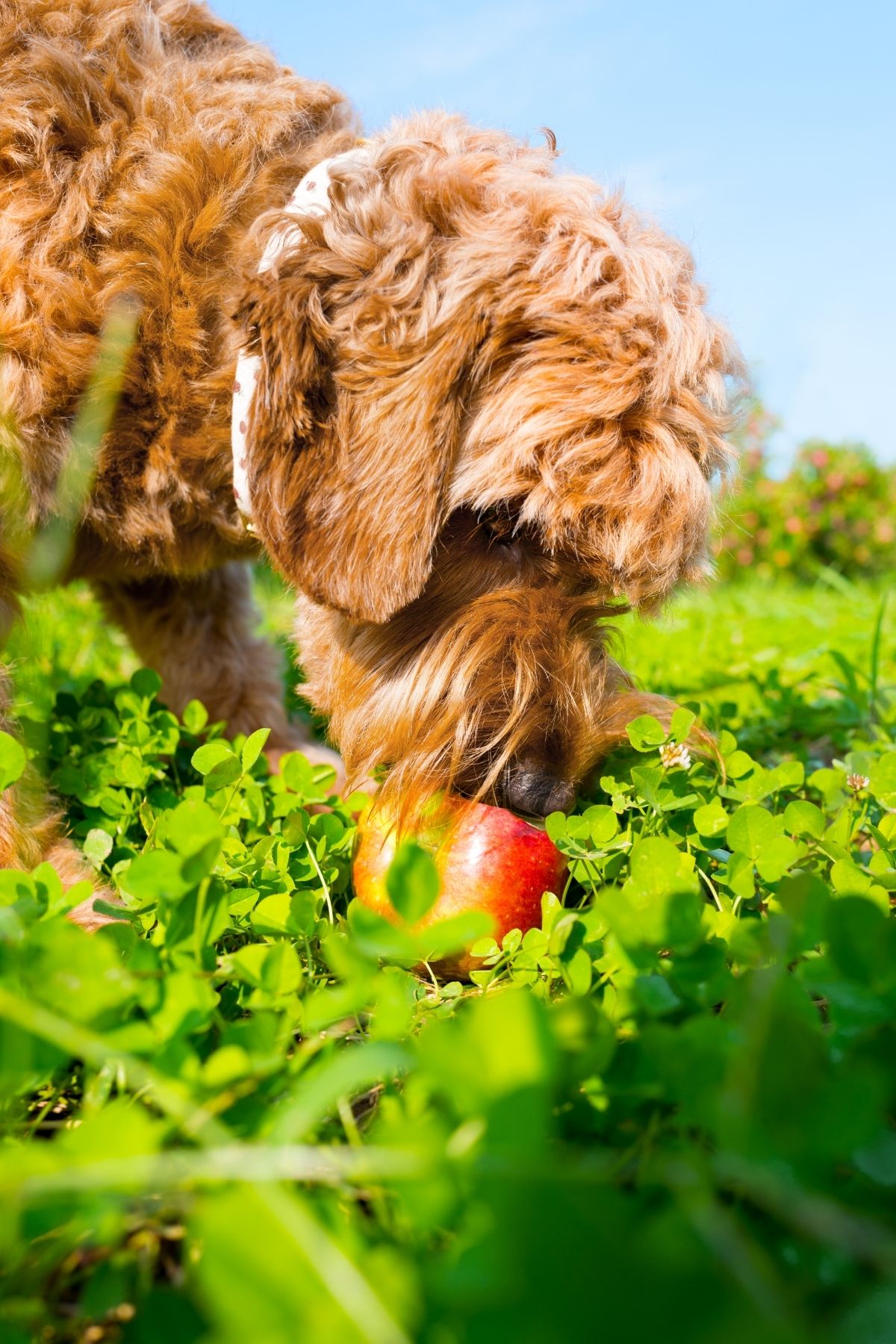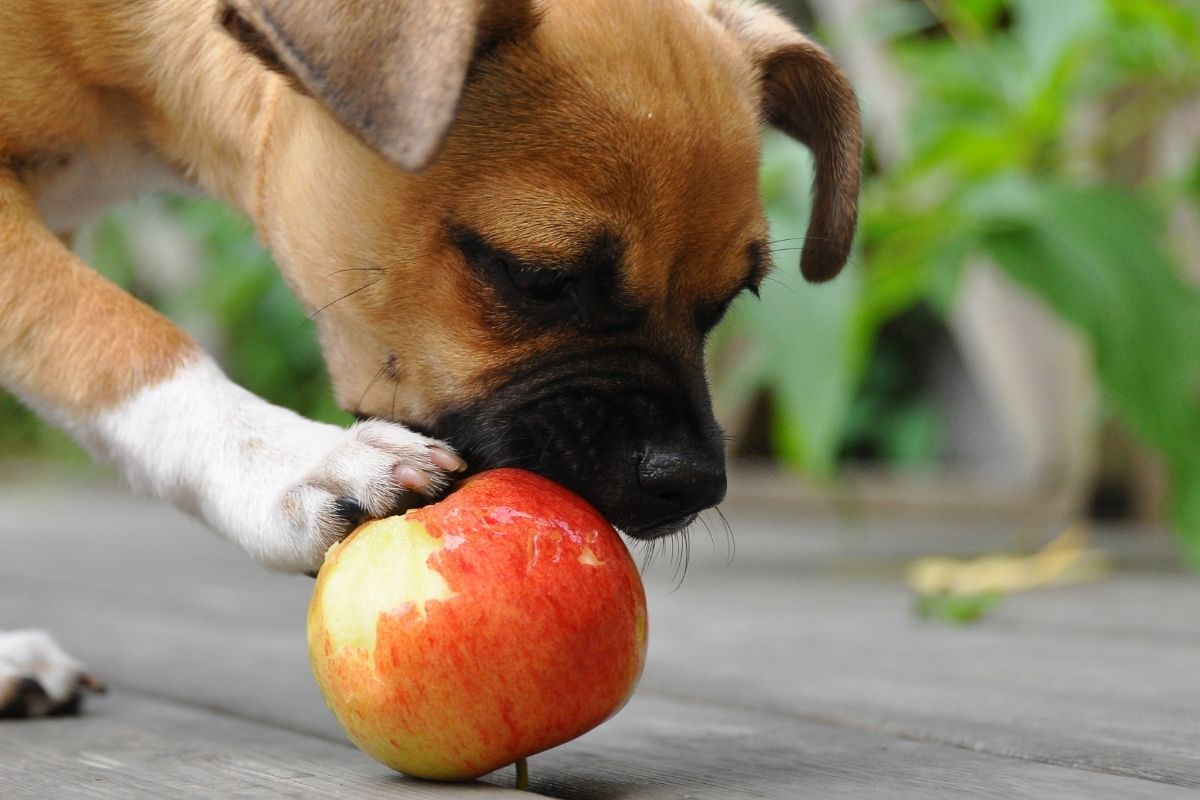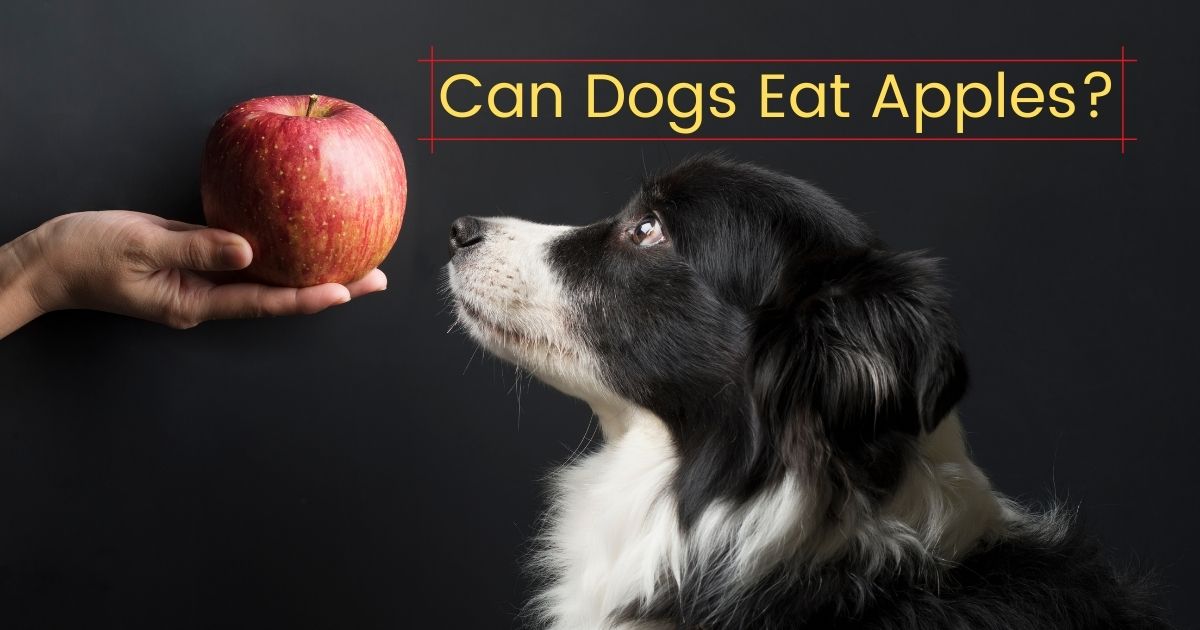Apples and Dogs
Can dogs eat apples? Yes, dogs can feed on apples, but you should consider certain factors before giving them to your dog.
These delicious fruits are high in nutrients that are good for your dog’s health, but there are some things to avoid, such as cores and seeds. Also, moderation is crucial with apples, as with anything nice, because too many apples can cause stomach discomfort in dogs.
Are Apples Good for Dogs?
Apples can be a food of low-cost, high-nutrient food that benefits dogs. This is an excellent choice as a snack or incentive during training, as long as they eat apples in moderation. However, if consumed, it can induce a choking hazard and gastrointestinal blockage.
Apples should be ingested in moderation by dogs because they contain sugar. Sugar can create issues in dogs with cancer or diabetes, so consult your veterinarian before feeding it to your pet. Furthermore, even healthy dogs may get stomach discomfort or diarrhea if they consume too many apples.
They’re low in protein and high in fiber, which helps aid digestion and makes them a good choice for dogs on reduced-protein or low-fat diets. This is especially good for aged dogs or dogs with specific health issues. They also include many calcium-phosphorus vitamins A, C, and K.
The antioxidants in these fruits may help prevent cancer and relieve the symptoms of joint illness. Apples can also improve dogs’ dental health and breath by eating apples. Read our article and find out if dogs can eat oranges.

Can Dogs Eat Apples?
Dogs can eat apples because they are safe. Apples are high in vitamins A and C, as well as fiber, and are suitable for your dog. Because they are low in protein and fat, they are an ideal snack for older dogs. Just make sure the seeds and core are removed first. Then, try freezing them for a refreshing summer snack. It’s also used as a flavoring in apple-flavored dog treats.
Apples are a low-calorie treat ideal for dogs trying to lose or maintain weight. However, a whole apple will likely be too much for your dog because each apple has roughly 0.04 pounds (0.018 kilograms) of sugar.
On the other hand, apples are an excellent method to fulfill your dog’s sweet craving (unlike sugary treats like chocolate or other human foods, which might harm your pet).
Chewing an apple can help your dog’s teeth stay clean, but apple skins can become lodged between their teeth. Therefore, regular dental care, including daily brushings and veterinary dental cleanings, should not be substituted by eating apples.
They are occasional healthy snacks that can be quite refreshing and pleasant if served carefully and safely to your dog. Before offering your human-dog foods, such as apples, you should always consult your veterinarian. Here’s all you need to know about giving apples to dogs.
Can puppies eat apples? Apples are safe for puppies to consume. However, puppies must be supervised, especially if they have never eaten an apple before. As they consume a slice, keep a close eye on them. Then check if it causes them any stomach problems. Apples might be an excellent reward for your puppy if you don’t have any.
How Many Apples Can Dogs Eat?
Apples are pretty tasty for your growing puppy canine buddy but don’t offer too many. Your dog may suffer a stomach ache or diarrhea if he eats too many apples, so always feed them in moderation. Your dog’s hunger can be satisfied with just one or two apple slices.
Puppies can eat apples as well. If you haven’t fed them apples before, start with a modest amount, such as a slice or small cube. Keep an eye on them to ensure they don’t have an allergic reaction.
Look for signs of gastrointestinal distress, such as vomiting or diarrhea. If your dog has issues, stop feeding them apples and get medical advice as soon as possible.

Safely Giving Your Dog Apples
Can dogs eat apples safely? The answer is yes; however, do not feed an apple’s seeds or core to a dog because they contain a small amount of cyanide and can cause choking.
To remove bacteria and germs, start by washing and cleaning your apples. Because supermarket apples, like many other fruits and vegetables, supermarket apples have been treated with pesticides, washing them thoroughly is essential.
Keep the seeds away from your beloved pet: they contain a small quantity of cyanide, a toxin that can injure your dog if consumed in excessive amounts.
The firm core of the apple, as well as the stem, could choke your dog. If your dog eats the core or seeds of an apple, keep an eye out for signs of digestive distress or blockage, such as choking. Apples should be cut into slices or small cubes so that your dog may consume them effortlessly.
The apple will be easier for your dog to digest if it is peeled, and the amount of fiber will be reduced. Remember that just because your dog likes apples doesn’t imply they can eat apple pie. However, dogs will tolerate sneaking a mouthful. The additional sugar and golden crust humans like are too much for them (or a slice).
According to the Pet Poison Helpline, if your dog eats an apple pie with nutmeg, which contains the toxin myristicin, they may have problems. Nutmeg may produce moderate stomach upset in modest amounts. However, it can produce hallucinations, elevated blood pressure, and seizures in substantial dosages.
Is Apple Sauce Good for Dogs?
Many may ask themselves, is applesauce good for dogs? Yes, dogs can easily feed on plain applesauce without many challenges. However, be keen to choose unsweetened applesauce and offer it to them in bits because applesauce often contains added sugars.
After quite a long walk or on a hot summer day, freeze the applesauce in ice cube trays and enjoy it with your dog.
How to Feed Apples to Your Dog Safely
Many dogs enjoy the taste and the delightful crunch of this chilly treat. Apples are delicious for dogs when raw, but you can also make apple treats with dog-friendly recipes. You may be asking yourself, can dogs eat cooked apples? Dogs can eat cooked apples.
The most straightforward technique to make roasted apple chips for dogs is to bake thinly sliced (and cored) apple slices until thoroughly crispy at 200 degrees Fahrenheit (93.3 degrees Celsius) for two hours. We can also be curious to know, can dogs eat apples and peanut butter? Apple peanut butter cookies are sure to be a hit with your dog.
Combine 4 cups of oat flour, 2/3 cup unsweetened applesauce, 1/2 cup peanut butter, and two eggs in a mixing bowl. Cut out cookies and bake for 20 to 25 minutes. Apple pretzels for dogs is one of our favorite recipes; it’s a simple treat that only requires three ingredients: unsweetened applesauce, almond flour, and eggs.
When are Apples Bad for Dogs?
Can dogs eat apple cores? Apple cores can be harmful if your dog eats a lot of them. The seeds and cores are the most crucial parts to watch for when giving apples to your dogs. The seeds contain cyanide, a dangerous substance in tiny amounts.
It would take a significant number of seeds to cause cyanide poisoning, so your dog is unlikely to be hurt if he eats a handful. Nonetheless, endangering your dog’s health is unwarranted. As a result, before feeding your dog apples, remove the seeds. In addition, some people believe that stems can be dangerous as well. As a result, it’s best to get rid of them as well.
The apple’s core is firm, making it difficult for most dogs to ingest. Apple-flavored or apple-containing products frequently contain sugar, artificial flavors, and chemicals. Before giving your dog any human foods, always read the labels and stay clear from added sugars, artificial sweeteners like xylitol, and unfamiliar ingredients, since these might be dangerous.
Because many shop apples are coated with additives that make them shiny, it’s best to buy organic apples. In addition, fruits should be washed before eating since they may contain herbicides or pesticides.
As with most foods, there’s a chance your dog will be allergic to them. Anaphylaxis, a potentially lethal condition, can be caused by allergic reactions in rare situations.
If you see any signs of an allergic reaction in your dogs, such as coughing, sneezing, swelling, hives, difficulty breathing, or other symptoms, stop feeding them to your dogs. Instead, make an appointment with your veterinarian right away.

Parting Words
You must provide the best possible care for your dog. This includes meeting their nutritional requirements. For example, giving apples to your dog is essential since it provides them with vitamins A, C, and K and calcium and phosphorus.
To give apples to your dog, all you have to do is be patient and follow the instructions in this article. You should also plan an appointment with your veterinarian to learn more about your dog.
Have you begun feeding apples to your dog? Begin today and see your dog grow in the greatest way possible.
